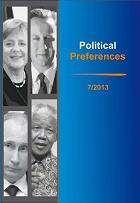Blogi internetowe polityków a identyfikacje partyjne
Politicians Internet blogs and political preferences
Author(s): Jarosław WichuraSubject(s): Politics / Political Sciences
Published by: Wydawnictwo Uniwersytetu Śląskiego
Keywords: blogs, Internet, new media, politics, politicians
Summary/Abstract: For politics, just like any member of the public, the Internet is a very convenient medium. It not only allows for a relatively low cost to reach diverse customers, but it is also an excellent tool for meeting the requirements of the politics personalization. Not only their own websites, on-line discussions and e-mail offer today a politician possibility of mediating communication with citizens (voters). Becoming increasingly popular, blog offers many exciting opportunities to provide information. Every political party can find a politician who owns and runs a blog (including Joanna Senyszyn, Waldemar Pawlak, Ryszard Czarnecki, Janusz Korwin-Mikke, Marek Migalski). Most of them treats virtual notebooks as a tool to present their views and image. They emphasize certain information which they believe and have not been adequately provided by other media. Undoubtedly, online diaries begin to play an increasingly important role today in political communication. Even though they are much more “poor” from parliamentary websites, because they contain only the texts published by the author, they are a great advantage of personalistic character. Popularity of blogs among politicians (not only in Poland) is steadily increasing. One of the things attesting to the validity of this court is its constant evolution. Online diaries are more and more powerful. You can now post on blog not only a text, but also a photo, short video or audio file. It should be noted that the political debate is closely dependent on the media and changing with the emergence of new communication tools. Blogs made a significant transfers in this area. For the purposes of this article, subject of study focused on two levels of analysis, for the elections to the Parliament (if they were held this Sunday) and in the context of political ideology. The analysis of empirical data was related to the two main issues: ownership and operation of political blogs and track their entries by the voters.
Journal: Political Preferences
- Issue Year: 2013
- Issue No: 7
- Page Range: 11-23
- Page Count: 13
- Language: Polish

